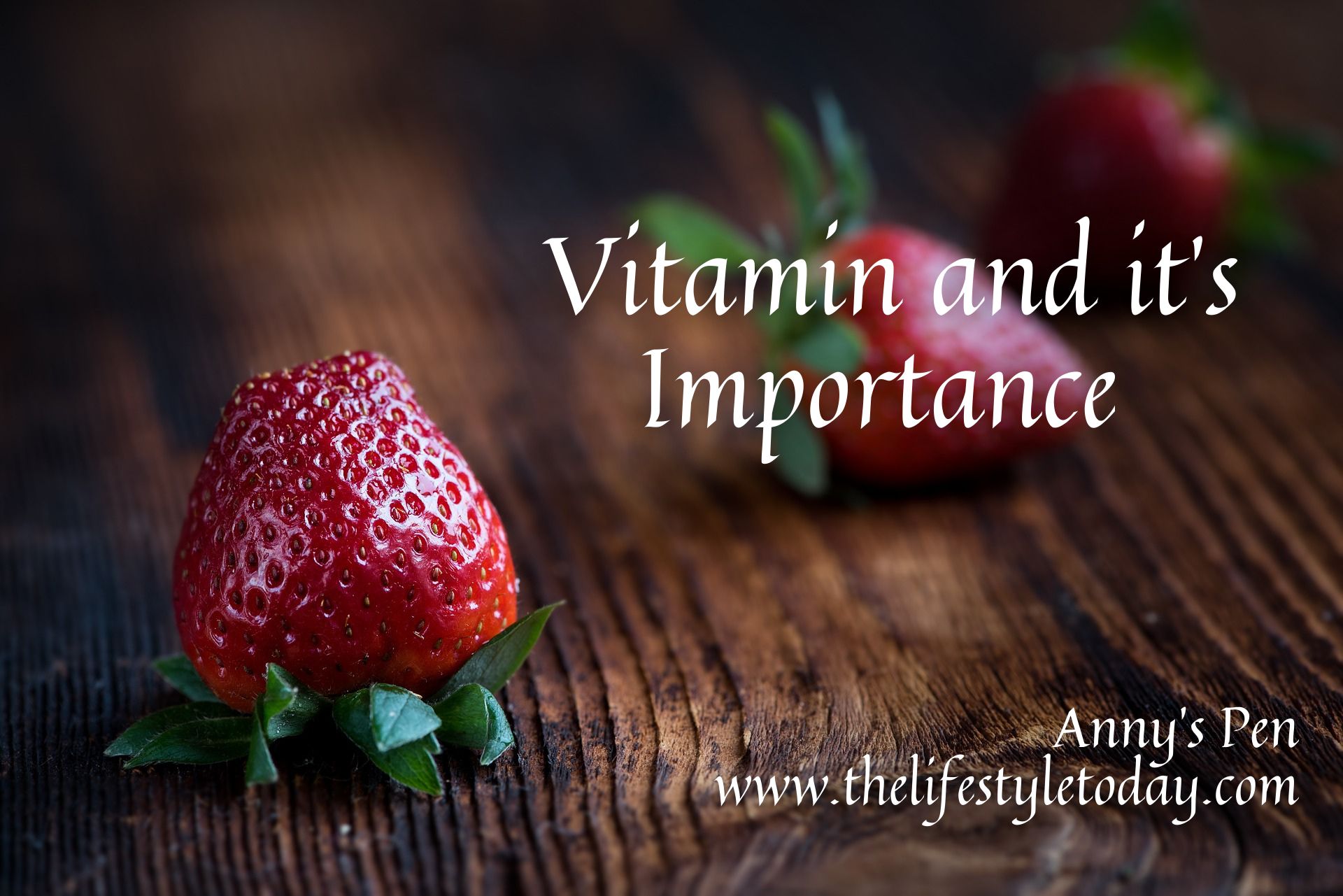Vitamins and their Importance in Human Body
What is a vitamin?
Vitamin is an organic compound present in food in a very little amount but an essential element for proper growth, development, and nutrition of living beings. Apart from a few exceptional cases, vitamins cannot be produced inside the body. We get all the necessary vitamins from our daily food.
Vitamin is needed in a very small quantity for the human body. Vitamins don't produce energy by itself but it helps to activate the necessary enzymes which help to produce energy by participating in metabolism. So, basically, vitamins act as a positive catalyst in the human body.
In 1889, scientist Lunin first noticed the fact that enough amount of carbohydrates, protein, fats, minerals, and water is not sufficient for the normal growth and development of human beings. Still, it suffers from malnutrition which can lead to death. This shows there is a special ingredient that completes the overall nutrition of a human being.
 |
Scientist Hopkins named this special ingredient as 'Accessory Food Factor'. In 1911, scientist Frank named this ingredient as 'Vitamine' which means vital amine. In Latin 'vita' stands for life and 'amine' means ammonia.
'Vitamine' means a compound for the human body that has ammonia in it. But later it has been seen that all vitamins do not contain ammonia. And that is why 'e' got excluded from the word 'vitamine' and 'vitamin' gets the identity as a significant part of nutrition.
Also Read:
Characteristics of Vitamins
- The requirement of vitamins is very little compared to the other nutrients we need for our proper growth and development. The portion of vitamins in our daily food is like milligrams or micrograms.
- Protein and minerals need vitamins to complete their portion of work in bodybuilding.
- Vitamins don't participate directly in bodybuilding but without them repairing, growth, etc remains incomplete.
- Vitamins are called biological catalyst as it helps to boost various internal works.
- Vitamins participate in metabolism with enzymes as co-enzymes.
- Vitamins are stored in the body in a very tiny amount. Fat-soluble vitamins remain stored in the liver and skin and water-soluble vitamins remain stored in the adrenal cortex.
- Deficiency of vitamins creates diseases like - Night-blindness, Scurvy, Pellegra, Beriberi, etc in the human body. The wrong choice of food and cooking procedure can be a cause of vitamin deficiency.
- Generally, vitamins cannot be synthesized inside human bodies. But there are some exceptions like vitamin A gets produced from the Carotene in the liver. Vitamin D can be synthesized from ergosterol in our skin with the help of sun rays. E-Coli bacteria in the intestine help to produce vitamin B12. Vitamin K can be synthesized in the large intestine.
Classification of Vitamins:
According to the water solubility vitamins can be classified into two categories :
i) Fat-soluble Vitamins
ii) Water-soluble Vitamins
i) Fat-soluble Vitamins
- Vitamin A and Carotene - Chemical name Retinol. Helps to prevent eye dryness.
- Vitamin D - D2 and D3: Chemical name Calciferol. Helps to prevent Rickets.
- Vitamin E - Chemical name Tocopherol. Helps to prevent infertility.
- Vitamin K - Chemical name Philoquinon. Helps in blood clotting.
Features of Fat-soluble Vitamins :
- Vitamin A, D, E, and K need a fat-based medium for getting absorbed into the human body. That's why our daily food should contain enough amount of fat otherwise there will be a deficiency of these vitamins in the body.
- These vitamins can be stored in the liver in enough amount. Vitamin D gets stored in the skin.
- An excess amount of these vitamins can create Hypervitaminosis.
- Vitamin A has a previous stage known as Carotene and the previous stage of vitamin D is known as Dehydrocholesterol.
- Amount of vitamins stored inside the body help during deficiency to a great extent. Still, our daily food should contain these vitamins.
- Cooking procedure doesn't affect their presence in food.
ii) Water-soluble Vitamins
- Vitamin C - Chemical name Ascorbic Acid. Helps to prevent Scurvy.
- Vitamin B Complex -
- B1 - Thiamine
- B2 - Riboflavin
- B3 - Nicotinic Acid or Niacin
- B4 - Choline
- B5 - Pantothenic Acid
- B6 - Pyridoxin
- B7 - Biotin
- B9 - Folic Acid
- B12 - Cyanocobalamin
Features of Water-soluble Vitamins :
- These vitamins get absorbed into the human body through water-based mediums.
- They do not get stored in the human body except for vitamin B12. Because of which we need to take these vitamins every day through food otherwise, there can be severe deficiency syndromes.
- Excess vitamins get excreted through urine.
- Among all the water-soluble vitamins only Niacin(B3) has a previous stage known as Tryptophan.
- The wrong cooking procedure can cause waste of water-soluble vitamins from daily food.
- Deficiency of these vitamins can cause various diseases. Such as -
- Beriberi - Due to deficiency of Thiamine(B1)
- Ariboflavinosis - Due to deficiency of Riboflavin(B2)
- Pellagra - Due to deficiency of Niacin(B3)
- Scurvy - Due to deficiency of Ascorbic Acid(B3)
Pseudovitamin :
The word 'Pseudo' means fake. There are some organic compounds having the same structure as a vitamin but they do not contain any quality of vitamins known as pseudovitamin. Such as vitamin B12(Cyanocobalamin) has a pseudovitamin named Methile Cobalamin.
Provitamins:
Provitamin means a compound that can be converted into a vitamin within an organism. Such as Beta Carotene is a provitamin of Thiamine(A) and Argosterol or 7 Dehydrocholesterol is the provitamin of vitamin D.
Anti-vitamin:
Antivitamins stands for a group of compounds that inactivates the necessary effects of vitamins in the human body. Antivitamins are antinutritional factors. Such as - Biotene has an antivitamin named Avidyne.
Hypervitaminosis:
It is a situation when the amount of a particular vitamin in the body gets increased. Hypervitaminosis can cause various problems along with toxicity.
Syndromes:
- Bone, joint, muscle pain
- Fatigues
- Headache
- Itchy, dry skin
- Irritation in eyes
- Feeling too sleepy
- Amount of urine gets increased etc.
Avitaminosis:
The deficiency of any particular vitamin in the body creates avitaminosis. There are different diseases that occur as a result of the deficiency of a vitamin. Such as Deficiency of vitamin D can cause Rickets in children and Osteoporosis in adults.
Conclusion:
So this was all for today's blog. In the upcoming blog posts, we will be knowing about each and every vitamin in detail. So stay tuned and let me know your opinion in the comment section below.
Hashtags to follow in Social Media:-
Thank you for visiting and reading.
Love and care from Anny's Pen.
See you in the next blog.








0 Comments